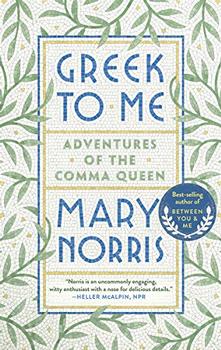Summary | Excerpt | Reviews | Beyond the Book | Readalikes | Genres & Themes | Author Bio

Adventures of the Comma Queen
by Mary NorrisInvocation
Sing in me, O Muse, of all things Greek that excite the imagination and delight the senses and magnify the lives of mortals, things that have survived three thousand years and more, since the time before the time of Homer, things that were old then and are new now—you know, the eternal. If that's not too much to ask, Muse. Please?
I don't know what gave me the idea I was good at foreign languages. I was an indifferent student of French in high school, though I longed to study at the Sorbonne instead of on the banks of the Cuyahoga. When I was in about fifth grade, my father refused to let me study Latin. The nuns had handpicked some students for a Saturday Latin class, and I was keen on it, but Dad flatly refused. My father was a pragmatic man. He worked for the fire department—one day on and two days off—and he could do anything around the house: roofing, plumbing, carpentry, laying linoleum. He grew up during the Depression, when jobs were scarce, so for him security was paramount.
When I asked Dad to let me study Latin, he stamped out that flame like a pro in his fireman's boots. Was Dad against education for women? Yes. Was he worried I would come too much under the spell of the nuns and join the convent instead of getting married and settling down in the neighborhood? Probably. Had he missed the story of how the father of John Milton, recognizing the lad's genius, had him tutored in Latin and Greek from earliest youth? Apparently. Had he been scarred by a dead language? Yes! As a teenager, my father, who had been kicked out of three high schools, was sent by my grandmother to Ontario, Canada, to stay with his uncle, who had been educated as a Jesuit seminarian but backed out just before taking his final vows—went over the wall, as they say—and returned to Ontario to farm pigs. Uncle Jim taught my father a few things, and my father passed them on to us at the dinner table, such as the proper way to feed a horse an apple (with the palm flat) and the myth of Sisyphus, whose eternal punishment was to roll a boulder up a mountain and have it always roll back down, so he had to start over again. It sounded like a particularly bleak life lesson. What activity might merit a statuette in the shape of Sisyphus? Renewed effort in the face of certain failure? Undying hope? Persistence in ordinary life? Anyway, my father associated the classics with punishment, the eternal damnation of Sisyphus in Tartarus or the temporary banishment of a juvenile delinquent to the remote home of his maternal ancestors in rural Ontario. So when the nuns invited me to study Latin on Saturdays, Dad said, "No way," and I missed that first chance to learn Latin while my brain was at its most absorbent.
In college, I continued with French for a year and then dropped it. My junior year, I took a course in linguistics and had a flare- up of lust for Latin. I would soon graduate and have to decide what to do next, and I had just figured out that four years of a liberal arts education was a delightful absurdity, a legitimate escape from real life, from Richard Nixon and the Vietnam War, a deferral of career and responsibility. I would study Latin, a dead language, for the sheer impracticality of it. I would know the joy of being a total nerd. But my linguistics professor, Whitney Bolton, talked me out of it. Latin, he said, would serve only to teach me about English. I didn't think to ask what was wrong with that. Remember, many linguists believe we are born hardwired to acquire language: I didn't need Latin to know English. Professor Bolton, whom I liked—he had a round head and a buzz cut, and reminded me of Anthony Hopkins as Richard the Lionheart in The Lion in Winter—told me I would be better off studying a living language, one that I could use in my travels. How did he know I wanted to travel? And Latin was spoken only in the Vatican. So I scratched that itch by taking a year of German. I've traveled a lot since then, but not in Germany, where Oktoberfest would no doubt have untied my tongue. Meanwhile, German did teach me a lot about English.
Excerpted from Greek to Me by William Norris. Copyright © 2019 by William Norris. Excerpted by permission of W.W. Norton & Company. All rights reserved. No part of this excerpt may be reproduced or reprinted without permission in writing from the publisher.
Finishing second in the Olympics gets you silver. Finishing second in politics gets you oblivion.
Click Here to find out who said this, as well as discovering other famous literary quotes!
Your guide toexceptional books
BookBrowse seeks out and recommends the best in contemporary fiction and nonfiction—books that not only engage and entertain but also deepen our understanding of ourselves and the world around us.